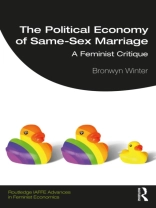Same-sex marriage is now legal in twenty-nine countries and the subject of continued debate around the world. The Political Economy of Same-Sex Marriage: A Feminist Critique considers this debate from a political economy perspective. Rather than engaging directly in the now well-rehearsed social-movement and academic for-and-against debates, this book focuses on processes of institutionalization of same-sex marriage and so-called ‘rainbow families’ within (neo)liberal capitalist democracies. It examines how states and markets appropriate same-sex marriage and family to enhance their own political and symbolic capital, consolidating power and profit within existing systems of gendered and raced socioeconomic stratification.
Taking a radical feminist, heterodox, qualitative and intersectional approach, this book investigates the political economy of same-sex marriage across three axes: same-sex marriage as institution; same-sex marriage and the market; and the political economy of the ‘rainbow family’. The examination of case studies from different countries and regions enables a comparative analysis that foregrounds cultural, political and economic path dependencies while at the same time highlighting a number of striking commonalities. In all the countries discussed in this book and in most respects, same-sex marriage has been integrated almost seamlessly into a mainstream/malestream political economy of marriage and family and its translation into added market and productive value.
The Political Economy of Same-Sex Marriage: A Feminist Critique will be of use to researchers and students alike, and indeed to all those who are curious about the mainstreaming of homosexuality within twenty-first-century capitalist democracies.












